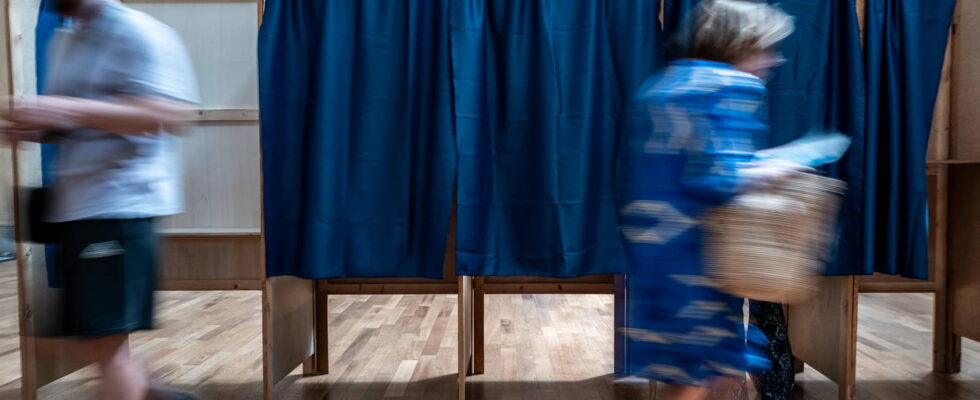Polling stations open at 8 a.m. in France this Sunday, June 30, for the first round of the 2024 legislative elections. Follow the day of voting live until the verdict this evening.
►Find your municipality or constituency to consult the lists of candidates for the legislative elections:
The essential
- The legislative elections begin this Sunday, June 30, 2024 across the country. The polling stations open their doors at 8 a.m. this morning and will close at 6 p.m. and even 8 p.m. for the last ones.
- The legislative elections began yesterday in departments, regions and overseas communities. Voters in Saint-Pierre and Miquelon started voting at 12 p.m., those in New Caledonia went to the polls at 10 p.m. (Paris time).
- An increase in participation is expected, with almost two thirds of voters. More than 2.6 million proxies have been registered since June 10. This is four times more than in 2022 over the same period.
- Follow the 2024 legislative election day live.
Live
06:00 – Legislative elections begin this Sunday in France
Hello and welcome to this live broadcast dedicated to the first round of the 2024 legislative elections. The voting day will begin at 8 a.m. in mainland France with the opening of the polling stations. Pollsters and politicians expect a very sharp increase in participation compared to the 2022 legislative elections, for which 47.51% of voters turned out. This time, participation could reach or even exceed two-thirds of the approximately 49 million registered.
Learn more
Emmanuel Macron announced the dissolution of the National Assembly only a few minutes after publishing the first estimates of the results of the European elections on Sunday June 9. A “serious, heavy” decision taken in light of the overwhelming victory of the National Rally in the European vote. “I trust the French people to make the fairest choice for themselves and for future generations. I have heard your message, your concerns, and I will not leave them unanswered,” declared the president of the Republic. By this decision, and the appeal to article 12 of the Constitution of the 5th Republic, Emmanuel Macron de facto recorded the organization of early legislative elections aimed at composing a new National Assembly.
The French are therefore called to vote in new legislative elections this Sunday, June 30 for the first round, followed by the second round a week later, on Sunday, July 7, 2024. Dates which arrive less than three weeks after the leader’s announcement of State. Why so early ? Well because in addition to the 20 to 40 day period provided for by the Constitution in the event of dissolution, the agenda for the coming months is busy, particularly with the start of the Olympic Games on July 26 and the arrival of the school holidays, which which limited the options for organizing the polls.
The day after the announcement of the dissolution of the National Assembly and the organization of legislative elections, the various parties entered the campaign, which will be express with barely three weeks between the announcement and the vote. The filing of candidacies ended on Sunday, June 16, to allow the official campaign to begin on Monday, June 17 and respect the two weeks of campaigning before a vote.
For these 2024 legislative elections, the left was the first to call for a union and even the formation of a “new popular front” from June 10. After several days of discussions, the four left-wing forces reached an agreement to present only one single candidate in the 577 constituencies in the first round. According to this agreement LFI will present 229 candidates, the PS will have 175, EELV will have 92 and the PCF will have 50.
On the right, alliances have also been announced, but with turmoil. The president of the Les Républicains party Eric Ciotti proposed an alliance with the National Rally which has shown itself inclined to a rapprochement. But the majority of LR members opposed this agreement and demanded the dismissal of Eric Ciotti. The LR candidates allied with the RN will ultimately be 62 in the first round. The Zemmourist Reconquest party also tried to get closer to the RN via Marion Maréchal, but the Lepéniste party refused any alliance. Eric Zemmour announced only 330 candidates in 577 constituencies.
Faced with these two forming alliances, the presidential majority reacted. Emmanuel Macron sought to expand his majority to the forces he considers to be part of the “Republican arc”, notably the socialist left reluctant to the alliance with LFI and the Republican right rejecting the agreement with the RN. But apart from a few local agreements and a few constituencies “reserved for the Republican arc”, in other words where the Macronists have not invested a candidate to give the left and the traditional right their chances, the contours of the majority remain confined to the Renaissance party and its allies (Horizons, Modem, UDI and central candidates).
The first polls on the results of the 2024 legislative elections began to be published the day after the announcement of the dissolution of the National Assembly. Until the end of the campaign, studies gave the advantage to the National Rally with more than 30% of voting intentions and up to 36 or 37% in the last days before the first round. The Union of the Left comes in second place in voting intentions with a little over 20% and the presidential majority is only given third place below 20%. The same studies therefore logically grant more seats to the RN in the second round.
According to studies by various institutes, the RN would become the majority group with 250 to 300 seats depending on the scenarios (compared to 89 currently). The left alliance would form the second force with 150 to 190 seats (compared to 153) and the presidential majority group would lose power with 90 to 130 seats (compared to 249). The Republicans would move to 30 or 40 seats (compared to 74).
